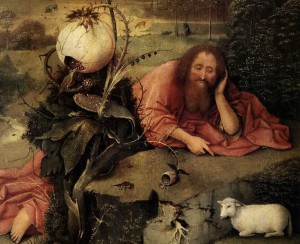Scott Hahn with David Scott
Jesus speaks through the prophet Isaiah in today’s First Reading.
He tells us of the mission given to Him by the Father from the womb: “’You are My servant,’ He said to Me.”
Servant and Son, our Lord was sent to lead a new exodus—to raise up the exiled tribes of Israel, to gather and restore them to God. More than that, He was to be a light to the nations, that God’s salvation may reach to the ends of the earth (see Acts 13:46-47).
Before the first exodus, a lamb was offered in sacrifice and its blood painted on the Israelites’ door posts. The blood of the lamb identified their homes and the Lord “passed over” these in executing judgment on the Egyptians (see Exodus 12:1-23,27).
In the new exodus, Jesus is the “Lamb of God,” as John beholds Him in the Gospel today (see 1 Corinthians 5:7; 1 Peter 1:18-19). Our Lord sings of this in today’s Psalm. He has come, He says, to offer His body to do the will of God (see Hebrews 10:3-13).
The sacrifices, oblations, holocausts, and sin-offerings given after the first exodus had no power to take away sins (see Hebrews 10:4). They were meant not to save but to teach (see Galatians 3:24). In offering these sacrifices, the people were to learn self-sacrifice—that they were made for worship, to offer themselves freely to God and to delight in His will.
Only Jesus could make that perfect offering of himself. And through His sacrifice, He has given us ears open to obedience, made it possible for us to hear the Father’s call to holiness, as Paul says in today’s Epistle.
He has made us children of God, baptized in the blood of the Lamb (see Revelation 7:14). And we are to join our sacrifice to His, to offer our bodies—our lives—as living sacrifices in the spiritual worship of the Mass (see Romans 12:1).
Saint John Chrysostom (c. 345-407)
Sermon on the Baptism of Jesus Christ and on the Epiphany
Christ was manifested to all, not at his birth but at his baptism. Before then, few knew him; almost no one knew he existed or who he was. John the Baptist said: “There is one among you who you do not recognise,” (Jn 1,26).
John himself shared the same ignorance of Christ up until his baptism: “I did not know him, but the one who sent me to baptise with water told me: ‘On whomever you see the Spirit come down and remain, he is the one who will baptise with the Holy Spirit”…
Indeed, what is the reason John gives for the Lord’s baptism? It was, he said, so that he might be made known to all. Saint Paul says the same thing: “John baptised with a baptism of repentance, telling the people to believe in the one who was to come after him,” (Ac 19,4).
This is why Jesus receives baptism from John. To have gone from house to house presenting Christ and saying he was the Son of God would have made John’s testimony extremely difficult; to have led him to the synagogue and designated him as the Saviour would have made his testimony hardly credible.
But that, in the midst of a large crowd gathered on the banks of the Jordan, Jesus should have received this testimony clearly expressed from heaven above and that the Holy Spirit should have descended on him in the form of a dove: this indeed confirmed John’s testimony without any shadow of doubt.
“I myself did not know him,” John said. Who made him known to you, then? “He who sent me to baptise.” And what did he say to you? “On whomever you see the Spirit come down and remain, he is the one who will baptise with the Holy Spirit.” Thus, it is the Holy Spirit who reveals to all he whose wonders John had proclaimed, by coming down to designate him, so to speak, with the touch of his wing.

